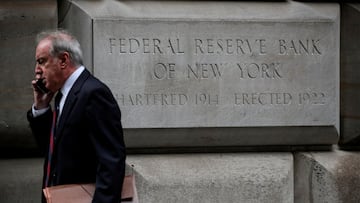Stimulus checks in 2022: how long will the Federal Reserve keep paying them?
The Federal Reserve announced it will taper off the pandemic stimulus program put in place almost two years ago, what does that mean for stimulus checks?

The US economy has been running hotter than experts and officials had forecasted which has led to the Federal Reserve to decide it will gradually end the pandemic stimulus program put in place nearly two years ago.
That program kept interest rates low to promote more liquidity in the market and stimulate the economic recovery from the covid-19 crisis. The central bank has also been buying Treasury bonds and mortgage-backed securities to inject large sums of cash into the US economy.
Also see:
- The Saver’s Credit could reduce your tax bill by $2,000
- When does COLA 2022 take effect in Social Security Benefits?
- Fed will slash stimulus spending in 2022
- Will it be possible to receive third stimulus check plus-up payments after 31 December 2021?
Stimulus checks are paid out by the Treasury
While the Federal Reserve controls the supply of money in circulation, it is the US Department of the Treasury that manages federal finances. The US Congress since the beginning of the covid-19 pandemic has approved three rounds of stimulus checks. Lawmakers tasked the IRS, which is part of the Treasury, with the job of sending taxpayers the direct payments, known as Economic Impact Payments, as an advance refund on the Recovery Rebates, two in 2020 and one in 2021.
Although it is up to Congress to approve another stimulus check, the move by the central bank to taper its bond purchasing and tighten monetary policy bodes ill for a potential fourth stimulus check. The Fed saw higher-than-normal levels of inflation as necessary to get the US economy back to full employment.
There are still 3.9 million fewer jobs in the US than before the virus upended lives and livelihoods across the nation and around the world. But job growth has been strong with an average 555,000 jobs created each month in 2021. It’s expected that the unemployment rate, currently below the natural rate at 4.2 percent, will continue to drop reaching 3.5 percent.
A surge in inflation, a rapidly falling unemployment rate and surprisingly high spending on wages convinced Jerome Powell, the Federal Reserve chair, to change course.https://t.co/kRNUVCm0Fj
— The New York Times (@nytimes) December 16, 2021
Fed thinks its time to tackle inflation
Several factors related to the disruptions caused by the covid-19 pandemic are to blame for the higher-than-normal inflation the US economy is experiencing, but the incredible amounts of money that were injected into the economy are also partially seen to be part of the problem. Inflation in November was the highest year-on-year increase since June 1982, at 6.8 percent it was slightly higher than had been predicted.
The Federal Reserve Board met in December for its final Federal Open Market Committee meeting of 2021 and it was decided that it was time to put the brakes on inflation. Afterwards, Chairman Jerome Powell told the press “Economic developments and changes in the outlook warrant this evolution of monetary policy, which will continue to provide appropriate support for the economy.”
“Supply and demand imbalances related to the pandemic and the reopening of the economy have continued to contribute to elevated levels of inflation."
The pace of inflation is uncomfortably high, Fed Chair Jerome Powell said, as the Fed announced it would end its pandemic-era bond purchases in March 2022 https://t.co/8C0Pp0YBJF pic.twitter.com/v4BYoE1XOI
— Reuters Business (@ReutersBiz) December 16, 2021
Stimulus payments will dry up at the end of 2021
It’s been nine months since Congress passed the last round of stimulus checks. Despite calls for more direct cash injections into American households both in the halls of Congress and from the public, for the time being, no more look set to be on the way. The final payments from the third Economic Impact Payment are supposed to go out before the end of the year. After that, taxpayers will need to claim any missing funds on their 2021 tax return.
Related stories
Under the American Rescue Plan, families with children 17 and younger since July had been receiving monthly direct payments through the 2021 Child Tax Credit advance payment scheme. Legislation to extend the program for one more year is being debated in the Senate, but in order to keep the monthly payments from being interrupted, something that is more than likely to happen, it needed to be enacted before 28 December.
The Senate adjourned until January for the Christmas holiday on Saturday morning without taking a vote on the Build Back Better Act that included the extension. Furthermore, Senator Joe Manchin, one of the main holdouts on the bill and critical votes for its passage, announced on “Fox News Sunday” that he was a “No” on the bill, effectively killing the extension of the enhanced Child Tax Credit along with the rest of the White House’s social and climate policy proposals in the sweeping $1.75 trillion legislation.
- Joseph Biden
- Coronavirus stimulus checks
- USA coronavirus stimulus checks
- IRS
- Central Bank
- United States Senate
- Child benefits
- Treasury bonds
- Covid-19 economic crisis
- Science
- United States Congress
- Social support
- Public debt
- Tesoro Público
- Coronavirus Covid-19
- Economic crisis
- United States
- Inland Revenue
- Deficit financing
- North America
- Parliament
- Budget deficit
- Economic climate
- Virology
- Outbreak
- America
- State administration
- Enterprises
- Economy
- Politics
- Society
- Finances
- Public administration
- Public finances


